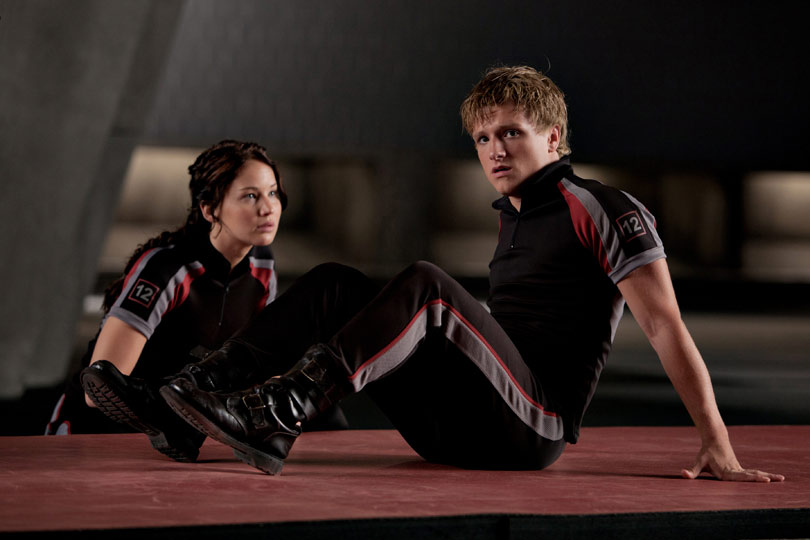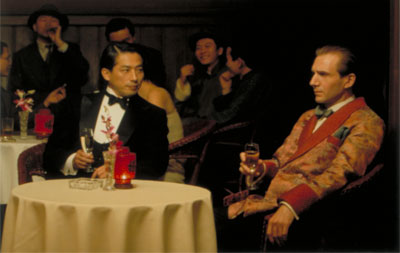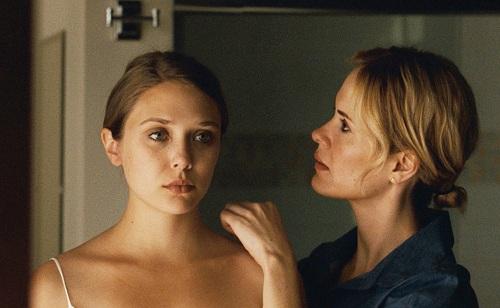

Director: Gary Ross, 2012. (PG-13)
In 2008 Suzanne Collins published “The Hunger Games,” the first book in a trilogy. Though aimed at teens, the same audience that ate up Harry Potter and then the Twilight series, Collins’ books have been well-received by young and old alike. After one of my kids’ completed the first two books, I was encouraged to read the first and found it to be a real page-turner! Not only is it an awesome adventure, but it presents a number of important themes thoughtfully. Collins describes them as "issues like severe poverty, starvation, oppression, and the effects of war among others" (from a Wikipedia article).
Now, almost four years later, the first of the books hits the big screen and it hits a home run as far as box office tickets are concerned. It took in $155M on its first weekend to become the third highest film ever, behind only Harry Potter and the Deathly Hallows Part 2 and The Dark Knight. But it was worth the take, being great entertainment, at least from my perspective.
 Most people know the basic plot. The film is set in a dystopian future, where war and violence has left the United States broken, now Panem with 12 districts surrounding the capital. Citizens of these districts live hard lives while President Snow (Donald Sutherland) rule with an iron-fist from the Capitol. To keep the citizens in their place and to discourage rebellion, each year two tributes are randomly selected from each district, one boy and one girl, to compete in the annual hunger games. Not a mere tournament, this is a violence fight to the death in a carefully crafted and controlled arena where only one child will emerge as victor. To that person go the spoils of war, glory and honor, and to his or her district goes extra food, a precious commodity to the starving citizens.
Most people know the basic plot. The film is set in a dystopian future, where war and violence has left the United States broken, now Panem with 12 districts surrounding the capital. Citizens of these districts live hard lives while President Snow (Donald Sutherland) rule with an iron-fist from the Capitol. To keep the citizens in their place and to discourage rebellion, each year two tributes are randomly selected from each district, one boy and one girl, to compete in the annual hunger games. Not a mere tournament, this is a violence fight to the death in a carefully crafted and controlled arena where only one child will emerge as victor. To that person go the spoils of war, glory and honor, and to his or her district goes extra food, a precious commodity to the starving citizens. Unlike the book, there is precious little backstory to introduce the film. Much is left unsaid, but then most viewers will already know this. The film quickly gets to the reaping, where the children wait anxiously to see if they will be selected. Effie Trinket (Elizabeth Banks), overmade-up and overdressed, emcees the event, fruitlessly tries to instill enthusiasm from those who would be led away to likely death (odds of 23-1 against!). When 13 year-old Prim Everdeen is selected, her 16 year-old sister Katniss (Jennifer Lawrence) steps in to volunteer to take her place, an act unheard of before. Joining her from District 12 is Peeta Mellark (Josh Hutcherson), a baker’s boy who has a secret crush on Katniss.
The first intersection with biblical Christianity is the theme of sacrifice. Although Katniss is a fighter and survivor, adept with archery, she is stepping up for almost certain death. She typifies a Christ-figure, willing to sacrifice herself to save her sister. Of course Jesus humbled himself and came to earth (Phil. 2:6-8) for the express purpose of going to the cross in our place. Our punishment and death (Rom. 3:25) became his. God “loved us and sent his Son as an atoning sacrifice for our sins” (1 Jn. 4:10).
The second part of the first act moves the story to the capitol, as Katniss and Peeta journey there to be prepared. Accompanying them are Effie and Haymitch Abernathy (Woody Harrelson). If Effie is to mentor them in etiquette, Haymitch is supposed to mentor them in survival. He is District 12’s only surviving victor, an alcoholic wretch of a man. And in the capital is Caesar Flickerman (Stanley Tucci, Julie and Julia), the oily host of the event, selling the show to the viewers.
One of the complaints against the film is that it underplays some characters and leaves out plenty of detail from the book. That has to happen in any film adaptation, but it is a minor complaint. Perhaps the largest character downplayed here is Gale (Lian Hemsworth), Katniss’s hunting friend and early love interest. He has almost no part here. His best line comes as he says goodbye to her at the station: “You’re stronger than they are. You are. They just want a good show, that’s all they want.” And it’s true. The citizens of the capitol just want something to watch.
 The Hunger Games offers commentary on today’s preoccupation with reality TV. Americans idolize these shows and their contestants. From American Idol to Biggest Loser, we tune in to see who is kicked off this week, all the while ignoring the serious things that are going on in the world. Such entertainment is an anesthetic, a distraction from our troubles. Indeed, Panem might be taken from the Latin phrase “panem et cirenses” meaning “bread and circuses”, which is a reference to the Roman formula for keeping the population in its place: give them food and fun. Such strategy sufficed to satisfy Cesar’s citizens. We must wake up and throw off the numbing yoke of mindless television.
The Hunger Games offers commentary on today’s preoccupation with reality TV. Americans idolize these shows and their contestants. From American Idol to Biggest Loser, we tune in to see who is kicked off this week, all the while ignoring the serious things that are going on in the world. Such entertainment is an anesthetic, a distraction from our troubles. Indeed, Panem might be taken from the Latin phrase “panem et cirenses” meaning “bread and circuses”, which is a reference to the Roman formula for keeping the population in its place: give them food and fun. Such strategy sufficed to satisfy Cesar’s citizens. We must wake up and throw off the numbing yoke of mindless television. Moreover, Collins herself commented in a quoted interview by Douglas Eby that audiences for “both the Roman games and reality TV are almost characters in themselves. They can respond with great enthusiasm or play a role in your elimination”. Even though they do here, it is clear that the entertainment has become almost a new reality for them. Like the text now to protect your favorite Idol singer, the viewers of the hunger games could support their favorites with parachuted supplies. Such reality is unreality.
Just before the film moves out of the capitol, we see Peeta and Katniss spending their last night on the roof of the building, watching the lights below. Peeta comments, “I just keep wishing I could think of a way to show them that they don’t own me. If I’m gonna die, I wanna still be me.” He has understood the theatrical nature of the event. He is a player, and the President and creators of the games want him to give a show, to take upon himself a role. They can select him, they can send him to certain death, but they do not own him. He retains his dignity even in death.
The second act of the film brings us to the action, where the 24 tributes must do battle in a contrived spectacle much like the Roman gladiatorial games. And here the pacing is perfect, retaining the tension while still allowing moments of reflection, such as between Katniss and the young girl, Rue. The pacing is not surprising given that Collins helped with the screenplay.
Another theme of the film is its anti-violence message wrapped up in its violent plot. The tributes are all children, and for the most part are innocents. They are all victims, creations of cruel adults for sheer entertainment. Collins, in an interview for Parade Magazine, commented on this as the inspiration for her story:
“I was channel surfing between reality TV programming and actual war coverage when Katniss’s story came to me. One night I’m sitting there flipping around and on one channel there’s a group of young people competing for, I don’t know, money maybe? And on the next, there’s a group of young people fighting an actual war. And I was tired, and the lines began to blur in this very unsettling way, and I thought of this story.”When children are forced into slavery or war, such as Ishmael Beah was in “A Long Way Gone”, they suffer loss of innocence. Such loss is beyond sad, it is tragic. Childhood should be a time of play and progress, of development and enjoyment. When it is cut short and they are forced to grow up prematurely it comes with a cost. Katniss evidences this here.
 Another social commentary is highlighted by Jennifer Lawrence, who said in an interview: “This is what our society could be like if became desensitized to trauma and to each other’s pain.” The viewers in the capital do not see the children as people; they see them as characters in a play. They don’t care that one by one they are dying. Their pain is ignored. Even the tributes are desensitized since they must kill or be killed, as in war. But when we lose empathy and compassion, we lose a little of our humanity. God is called the “Father of compassion” (2 Cor. 1:3), and Jesus commands us to “be kind and compassionate to one another” (Eph. 4:32). Apart from this we become like the rabble who cried “Crucify him” (Matt. 27:22). Indeed, when we are fully desensitized, we become the very soldier who nailed Jesus to the cross, and then we turn and look for more victims to satiate our bloodlust.
Another social commentary is highlighted by Jennifer Lawrence, who said in an interview: “This is what our society could be like if became desensitized to trauma and to each other’s pain.” The viewers in the capital do not see the children as people; they see them as characters in a play. They don’t care that one by one they are dying. Their pain is ignored. Even the tributes are desensitized since they must kill or be killed, as in war. But when we lose empathy and compassion, we lose a little of our humanity. God is called the “Father of compassion” (2 Cor. 1:3), and Jesus commands us to “be kind and compassionate to one another” (Eph. 4:32). Apart from this we become like the rabble who cried “Crucify him” (Matt. 27:22). Indeed, when we are fully desensitized, we become the very soldier who nailed Jesus to the cross, and then we turn and look for more victims to satiate our bloodlust.There is a great scene toward the end of the film that does not appear in the book. President Snow is genteelly pruning roses in his garden while talking to the Games Master. He tells him that the people need fear and hope, but not too much hope. A little hope goes a long way; too much and they will get ideas. With these two concepts, the carrot and the stick, he can control and manipulate the masses, keeping them subservient and somewhat loyal.
These two concepts play out biblically. Like Katniss, we all face tribulations and suffering. But the apostle Paul tells us “we also glory in our sufferings, because we know that suffering produces perseverance; perseverance, character; and character, hope” (Rom. 5:3-4). Hope is an end-goal, but hope does not disappoint (Rom. 5:5) because we have the love of God in us and a future waiting with him (Phil. 3:20). Such hope is central to the gospel of Jesus Christ. But fear is crucial, too. The fear of the Lord is both the beginning of knowledge (Prov. 1:7) and wisdom (Prov. 9:10). Such fear refers to reverence and awe. It points to the attitude of the true follower of Jesus, who worships God who has created all things. Such fear enables us to see ourselves for who we are: creatures in need of forgiveness. Yet it also enables us to retain our uniqueness, as Peeta desired, not being forced into a role or image of another’s making.
President Snow and Effie Trinket may offer the platitude, “may the odds be ever in your favor” to the tributes hoping for victory. But if we embrace the fear of the Lord, then the odds will be ever in our favor of realizing our hope for true victory!
Copyright©2012, Martin Baggs


















 The plot is simple, how will Martha handle return to normal life after two years in the cult. But debut writer-director Sean Durkin has crafted an atmospheric chiller that is disturbing and unsettling while being unforgettable. With a moody score, the tension increases slowly until the audience is nervous just watching Martha.
The plot is simple, how will Martha handle return to normal life after two years in the cult. But debut writer-director Sean Durkin has crafted an atmospheric chiller that is disturbing and unsettling while being unforgettable. With a moody score, the tension increases slowly until the audience is nervous just watching Martha. The methods of a cult are further evidenced in their early and easy acceptance of the “acolyte”. These young women like Martha have broken or missing family. They are seeking acceptance and relationship. They crave love. They find it in Patrick and the others. Patrick tells Marcy May, “You are a leader and a teacher,” although he has nothing to base this on. It is a false promise. Yet it is one that triggers a hope in her, since she has not heard such positive affirmation before. Like this false hope his love is a false love, a diabolical lie.
The methods of a cult are further evidenced in their early and easy acceptance of the “acolyte”. These young women like Martha have broken or missing family. They are seeking acceptance and relationship. They crave love. They find it in Patrick and the others. Patrick tells Marcy May, “You are a leader and a teacher,” although he has nothing to base this on. It is a false promise. Yet it is one that triggers a hope in her, since she has not heard such positive affirmation before. Like this false hope his love is a false love, a diabolical lie. As Martha tries to come back to normal life, she finds the distance too much. She simply does not know what normal is. And to Lucy and Ted, she is abnormal, mentally damaged in need of professional help. It reminds us that through subtle brainwashing, cults can create a warped norm that we accept as reality. Once accepted, control is accomplished. Marcy May and the other women accepted Patrick’s every command as perfectly normal and when he requires crime they do not blink an eye. He has conquered their will.
As Martha tries to come back to normal life, she finds the distance too much. She simply does not know what normal is. And to Lucy and Ted, she is abnormal, mentally damaged in need of professional help. It reminds us that through subtle brainwashing, cults can create a warped norm that we accept as reality. Once accepted, control is accomplished. Marcy May and the other women accepted Patrick’s every command as perfectly normal and when he requires crime they do not blink an eye. He has conquered their will.




